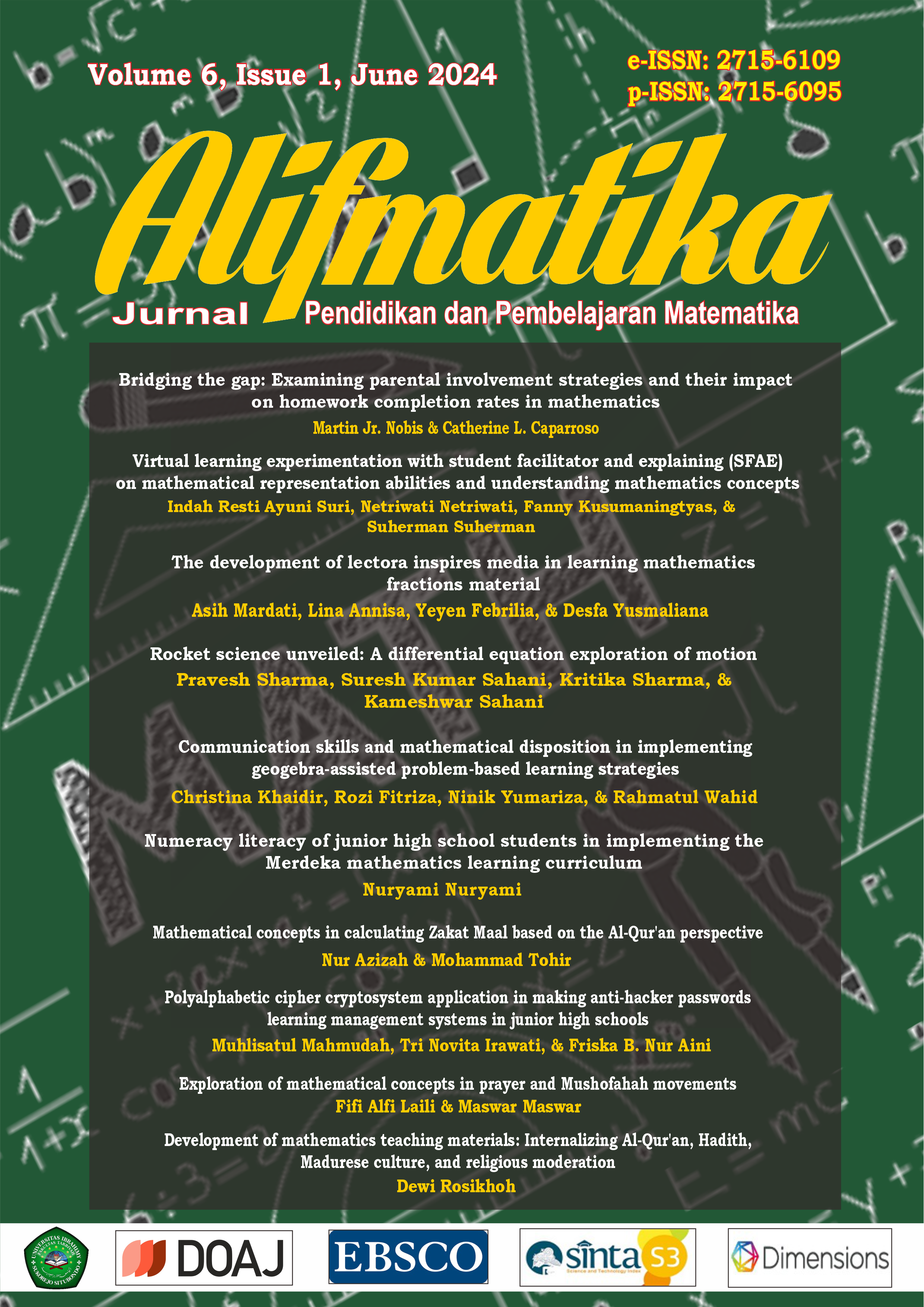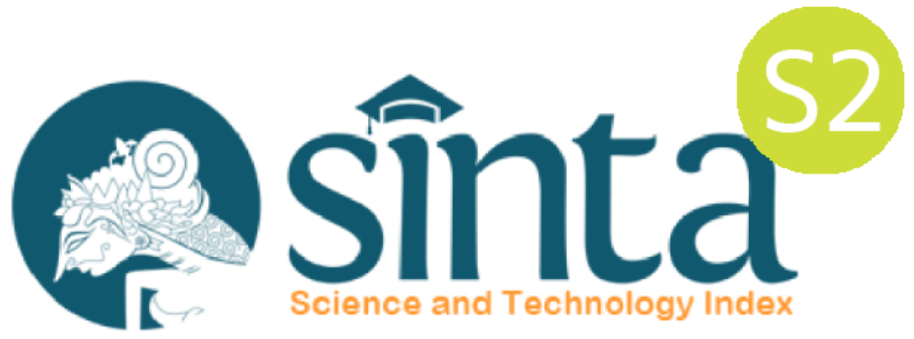Communication skills and mathematical disposition in implementing geogebra-assisted problem-based learning strategies
DOI:
https://doi.org/10.35316/alifmatika.2024.v6i1.51-62Keywords:
Communication Skills, Implementing Geogebra-Assisted, Mathematical Disposition, Problem-Based LearningAbstract
This paper aims to determine students' communication skills and mathematical disposition in implementing problem-based learning strategies using the Geogebra application. This type of research was a quasi-experiment with a control group design. The subjects of this research were classes A and B. The population in this research was all students in the odd semester 2023/2024 who were taking the Plane and Space Geometry course, which consists of two classes that were tested using the t-test with data from the student's final test. Based on calculations of the results of students' mathematical communication skills, specifically the experimental class 81.00 and the control class 71.16. Thus, students' mathematical communication abilities in problem-based learning assisted by Geogebra were better than those in conventional education. On the other hand, the results of students' mathematical disposition abilities were 76.59 for the experimental class and 68.16 for the control class. Thus, students' mathematical disposition abilities in problem-based learning assisted by Geogebra were better than those in conventional education.
Downloads
References
Andini, Y. D., Fitriza, R., & Susanto, A. (2023). Mathematical disposition of students taught with the three step interview model. Proceedings of Imam Bonjol International Conference on Islamic Education. 713–719. https://ibicie.uinib.ac.id/index.php/ibicie/article/view/113
Ansari, B. I. (2016). Komunikasi matematika, strategi berfikir dan manajemen belajar (konsep dan aplikasi) [Mathematical communication, thinking strategies and learning management (concepts and applications)]. Pena.
Baroody, A. (1998). Fostering children’s mathematical power. Lawrence Erlbaum.
Depdiknas. (2002). Kurikulum berbasis kompetensi mata pelajaran matematika [Competency-based curriculum for mathematics subjects]. Pusat Kurikulum
Deswita, R., & Kusumah, Y. S. (2018). Peningkatan kemampuan komunikasi matematis siswa melalui model pembelajaran core dengan pendekatan scientific [Improving students' mathematical communication skills through core learning models with a scientific approach]. Edumatika : Jurnal Riset Pendidikan Matematika, 1(1), 35-43. https://doi.org/10.32939/ejrpm.v1i1.220
Eliza, R. (2016). Media pembelajaran sebagai sarana komunikasi matematika di sekolah dasar [Learning media as a means of mathematical communication in elementary schools]. Ta’dib, 13(2), 152-159. https://doi.org/10.31958/jt.v13i2.186
Fairus, F., Fauzi, A., & Sitompul, P. (2023). Analisis kemampuan disposisi matematis pada pembelajaran matematika siswa SMKN 2 Langsa [Analysis of mathematical disposition abilities in mathematics learning of students at SMKN 2 Langsa]. Jurnal Cendekia : Jurnal Pendidikan Matematika, 7(3), 2382–2390. https://doi.org/10.31004/cendekia.v7i3.2549
Gonzalez-Argote, J., & Castillo-González, W. (2024). Problem-based learning (PBL), review of the topic in the context of health education. Seminars in Medical Writing and Education, 3(1), 1–7. https://doi.org/10.56294/mw202457
Greenes, C., Schulman, L., & Spungin, R. (1992). Stimulating communication in mathematics. The Arithmetic Teacher, 40(2), 78–82. https://doi.org/10.5951/AT.40.2.0078
Isrok’atun. (2020). Creative problem solving dan disposisi matematis dalam situation based learning [Creative problem solving and mathematical disposition in situation based learning]. UPI Sumedang Press.
Lundin, S. (2012). Hating school, loving mathematics: On the ideological function of critique and reform in mathematics education. Educational Studies in Mathematics, 80(12), 73–85. https://doi.org/10.1007/s10649-011-9366-6
Maulyda, M. A., Annizar, A. M., Hidayati, V. R., & Mukhlis, M. (2020). Analysis of students’ verbal and written mathematical communication error in solving word problem. Journal of Physics: Conference Series, 1538(1), 1–11. https://doi.org/10.1088/1742-6596/1538/1/012083
Mulyono Abdurrahman. (1998). Pendidikan bagi anak berkesulitan belajar [Education for children with learning difficulties]. Rineka Cipta
Nalman, A. R., & Susanta, A. (2023). Pengaruh model pembelajaran problem based learning (PBL) terhadap kemampuan pemahaman konsep dan kemampuan pemecahan masalah matematika siswa kelas VIII SMP Negeri 10 kota Bengkulu. Journal on Education, 6(1), 12-24. https://doi.org/10.31004/joe.v6i1.2909
Nari, N. (2015). Kemampuan komunikasi dan disposisi matematis mahasiswa pada mata kuliah geometri [Students' mathematical communication skills and disposition in geometry courses]. Ta’dib, 18(2), 150–162. https://doi.org/10.31958/jt.v18i2.287
Nisa, F. B., Mukhlis, M., & Maswar, M. (2020). Analisis hubungan antara kecerdasan logis matematis dengan kemampuan komunikasi matematis siswa [Analysis of the relationship between logical mathematical intelligence and students' mathematical communication abilities]. Alifmatika: Jurnal Pendidikan Dan Pembelajaran Matematika, 2(2), 199–211. https://doi.org/10.35316/alifmatika.2020.v2i2.199-211
Putri, S. A., Sepriyanti, N., & Eliza, R. (2022). Pengembangan LKPD matematika berbasis group investigation untuk meningkatkan kemampuan komunikasi matematis peserta didik [Development of group investigation-based mathematics LKPD to improve students' mathematical communication skills]. Math Educa Journal, 6(1), 47–56. https://ejournal.uinib.ac.id/jurnal/index.php/matheduca/article/view/3919
Rianti Rahmalia, Hajidin, H., & BI. Ansari. (2020). Peningkatan kemampuan komunikasi matematis dan disposisi matematis siswa SMP melalui model problem based learning [Improving mathematical communication skills and mathematical disposition of junior high school students through problem based learning models]. Numeracy, 7(1), 137–149. https://doi.org/10.46244/numeracy.v7i1.1038
Rismawati, M., & Hutagaol, A. S. R. (2018). Analisis kemampuan pemahaman konsep matematika mahasiswa PGSD STKIP Persada Khatulistiwa Sintang [Analysis of the ability to understand mathematical concepts of PGSD students at STKIP Persada Khatulistiwa Sintang]. Jurnal Pendidikan Dasar PerKhasa, 4(1), 91-105. https://doi.org/10.31932/jpdp.v4i1.17
Riza, V. S., & Mirna. (2020). Analisis kemampuan komunikasi matematis siswa kelas vii smp negeri 31 padang tahun pelajaran 2019/2020 [Analysis of mathematical communication skills of grade VII students of SMP Negeri 31 Padang in the 2019/2020 academic year]. Jurnal Edukasi dan Penelitian Matematika, 9(3), 90–96. http://doi.org/10.24036/pmat.v9i3.10500
Rochim, A., & Herawati, T. (2021). Deskripsi pembelajaran matematika berbantuan video geogebra dan pemahaman matematis siswa pada materi fungsi kuadrat [Description of Geogebra video-assisted mathematics learning and students' mathematical understanding of quadratic function material]. Mosharafa: Jurnal Pendidikan Matematika , 10(2), 269-280. https://doi.org/10.31980/mosharafa.v10i2.660
Ruseffendi, E. T. (2018). Apakah teori perkembangan kognitif piaget berlaku di indonesia? [Does Piaget's theory of cognitive development apply in Indonesia?]. UJMES (Uninus Journal of Mathematics Education and Science), 3(2), 99–103. https://doi.org/10.30999/ujmes.v3i2.541
Saputra, P., Susanto, A., Mardika, F., & Fajriah, W. (2023). Kemampuan komunikasi matematis siswa dengan model eliciting activities dan problem based learning [Students' mathematical communication skills with eliciting activities and problem based learning models]. EDUSAINS: Journal of Education and Science, 1(1), 17-24. https://doi.org/10.57255/edusains.v1i1.251
Simanjuntak, T. D. L., Lubis, A., & Mulyono, M. (2018). Analisis disposisi matematis dalam penerapan pembelajaran kooperatif tipe Jigsaw [Analysis of mathematical disposition in the application of Jigsaw type cooperative learning]. Paradikma Jurnal Pendidikan Matematika, 11(2), 1–5. https://doi.org/10.24114/paradikma.v11i2.22891
Sukamto. (2013). Strategi quantum learning dengan pendekatan konstruktivisme untuk meningkatkan disposisi dan penalaran matematis siswa [Quantum learning strategy with a constructivist approach to improve students' mathematical disposition and reasoning]. Journal of Primary Educational, 2(2), 91-98. https://doi.org/10.15294/jpe.v2i2.3068
Suriasumantri. (1988). Filsafat ilmu [Science phylosophy]. Sinar Harapan.
Tanjung, I. K., Saragih, R. M. B., & Simamora, Y. (2023). Pengaruh model pembelajaran inquiry berbantuan geogebra terhadap kemampuan pemahaman konsep matematis siswa [The influence of the Geogebra-assisted inquiry learning model on students' mathematical concept understanding abilities]. Journal on Education, 6(1), 475–486. https://doi.org/10.31004/joe.v6i1.2287
Wahid, R., Eliza, R., & Susanto, A. (2023). Kemampuan berpikir kritis matematis menggunakan pendekatan metaphorical thinking [Critical mathematical thinking skills using the metaphorical thinking approach]. Jurnal Cerdas Mahasiswa, 5(1), 12–22. https://doi.org/10.15548/jcm.v5i1.6677
Wardani. (2008). Meningkatkan kemampuan berfikir kreatif dan disposisi matematik peserta didik SMA melalui pembelajaran dengan pendekatan model Sylver [Improving creative thinking skills and mathematical disposition of high school students through learning with the Sylver model approach]. Disertasi pada Sekolah Pascasarjana Universitas Pendidikan Indonesia, tidak dipublikasi.
Winarni, S., Rohati, R., Kumalasari, A., & Marlina, M. (2021). Analisis pengaruh disposisi matematika terhadap kemampuan komunikasi dan pemecahan masalah [Analysis of the influence of mathematical disposition on communication and problem solving abilities]. AKSIOMA: Jurnal Program Studi Pendidikan Matematika, 10(3), 1325. https://doi.org/10.24127/ajpm.v10i3.3511
Yumariza, N., Susanto, A., & Khaidir, C. (2023). Mathematical disposition of students learning with the giving question and getting answer model. Proceedings of Imam Bonjol International Conference on Islamic Education, 4(1) 132-139. https://ibicie.uinib.ac.id/index.php/ibicie/article/view/55
Zaozah, E. S., Maulana, M., & Djuanda, D. (2017). Kemampuan pemecahan masalah dan disposisi matematis siswa menggunakan pendekatan problem-based learning (PBL) [Problem solving abilities and mathematical dispositions of students using the problem-based learning (PBL) approach]. Jurnal Pena Ilmiah, 2(1), 781-790. https://doi.org/10.17509/jpi.v2i1.11214
Zulmiah, Eliza, R., & Susanto, A. (2023). Realistic mathematics education approach. AIP Conference Proceedings, 2805(1), 147–155. https://doi.org/10.1063/5.0148141
Downloads
Published
How to Cite
Issue
Section
License
COPYRIGHT NOTICE
Author (s) who publish in Alifmatika: Jurnal Pendidikan dan Pembelajaran Matematika agree to the following terms:
- The Author (s) submitting a manuscript do so on the understanding that if accepted for publication, copyright of the article shall be assigned to Alifmatika: Jurnal Pendidikan dan Pembelajaran Matematika, Tarbiyah Faculty of Ibrahimy University as the publisher of the journal. Consecutively, author(s) still retain some rights to use and share their own published articles without written permission from Alifmatika: Jurnal Pendidikan dan Pembelajaran Matematika. This work is licensed under a Creative Commons Attribution-ShareAlike 4.0 International License.
- Copyright encompasses rights to publish and provide the manuscripts in all forms and media for the purpose of publication and dissemination, and the authority to enforce the rights in the manuscript, for example in the case of plagiarism or in copyright infringement.
- Alifmatika: Jurnal Pendidikan dan Pembelajaran Matematika and the Editors make every effort to ensure that no wrong or misleading data, opinions or statements be published in the journal. In any way, the contents of the articles and advertisements published in Alifmatika: Jurnal Pendidikan dan Pembelajaran Matematika are the sole responsibility of their respective authors and advertisers.
- The Copyright Transfer Form can be downloaded here [Copyright Transfer Form Alifmatika]. The copyright form should be signed originally and send to the Editorial Office in the form of original mail, scanned document to alifmatika[at]ibrahimy.ac.id or upload the scanned document in the comments column when sending the manuscript.























_by_Matematohir.jpg)






